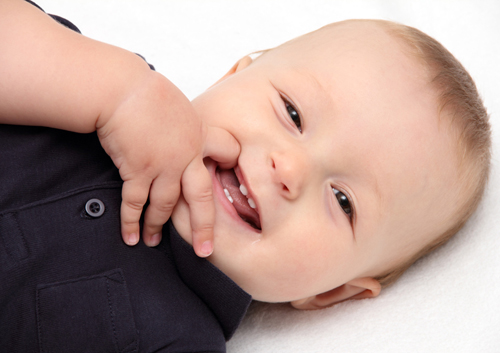January 25th, 2023

If your child participates in sports or other physical activities, it’s wise to consider getting a mouthguard. Also known as mouth protectors, mouthguards are a device worn over the teeth to lessen the impact of a blow to the face.
This reduces the chance that your child might lose teeth or sustain other serious oral injuries. We recommend that all patients involved in a contact sport such as wrestling, football, or hockey wear a mouthguard because of the high risk of such injuries.
However, anyone involved in a physically demanding sport or activity should wear a mouthguard as well.
Can you imagine what it would be like to lose a few of your front teeth? The way you talk, eat, and smile would all change.
Injuries that can be sustained when not wearing a mouthguard include:
- Chipped and broken teeth
- Fractured jaws
- Root damage
- Concussions
- Injury to the lips, cheeks, or gums
Types of Mouthguards
There are three different types of mouthguards — typically made of a soft plastic material or laminate. You can decide which works best for your child in terms of budget, fit, and comfort.
- Stock mouthguards are prefabricated to a standard size. They offer adequate protection, but you need to find one that fits your child properly and comfortably. Stock mouthguards are readily available at department stores, sporting goods stores, and online.
- Boil-and-bite mouthguards are placed in boiling water to soften them, then into the mouth so they can conform to the shape of the teeth. Boil-and-bite mouthguards are more expensive, but offer a more customized fit than stock ones. You can find these in department stores, pharmacies, sporting goods stores, and online.
- Custom-made mouthguards are created just for your child by Dr. Donald Schmitt and Dr. Rinku Saini. These offer the best fit and comfort of all the options, but they are also the most expensive. Ask a member of our Concord or Danville team for more information.
The American Dental Association says a good mouthguard should be easy to clean, fit properly, be comfortable, and resist tearing or damage. It shouldn’t restrict speech or breathing.
Still not sure if your child needs a mouthguard or which kind is right for his or her smile? Ask Dr. Donald Schmitt and Dr. Rinku Saini or one of our staff members for more information.
January 18th, 2023

After hours of juggling a wailing baby, you’re probably desperate to address teething pain. If your baby is irritable, drooling, and chewing on hard objects, he or she is likely teething. Although some discomfort while your baby is teething is inevitable, learning a few basic approaches can ease painful gums and soothe your frazzled nerves.
- Offer your finger. Simply chewing on your nice, plump finger may be enough to ease your little one’s pain. Make sure you clean your finger before placing it in your baby’s mouth.
- Use a teething ring. A firm rubber teething ring allows your child to gnaw, and alleviates pain. If your baby seems to like sucking on a bottle, replace the milk or formula with water during teething periods. This reduces sugar intake and decreases the risk of tooth decay.
- Cool it down. Stick a clean, moist washcloth in the freezer (place it on a tray for cleanliness) and offer that to your baby. The cooler temperature of the chilled cloth eases the pain of teeth erupting through the gums. Soaking the washcloth in non-caffeinated tea, such as chamomile, may reduce inflammation associated with teething.
- Grab some hard foods. Certain foods allow your kiddo to gnaw, and can ease teething pain. For example, frozen bananas, large chunks of chilled carrots, an apple, or frozen bagels make good teething pain relievers. If you’re offering your child solid food, watch carefully to ensure that your infant doesn’t bite off a piece and choke.
- Try a natural remedy. Years of grandmotherly wisdom suggest that home remedies might help with teething. Try rubbing clove oil, peeled ginger root, or vanilla extract onto your child’s gums. Although there isn’t scientific evidence to prove these remedies are effective, they may help your little one through the painful teething process. Just remember to test the method out on your own gums first to ensure any tingling or numbing is bearable for your child.
- Use medications. If your baby seems to be especially uncomfortable, over-the-counter medications may be appropriate. Giving an age-appropriate dose of acetaminophen (Tylenol) or ibuprofen (Advil) may reduce discomfort. Make sure you check with your child’s pediatrician or our office first to ensure the medication is safe.
If nothing seems to be helping your child’s teething pain, you can always schedule an appointment with Dr. Donald Schmitt and Dr. Rinku Saini. Our team at Drs. Schmitt & Saini Pediatric Dentistry understands the unique health needs of your little one, and are more than happy to help ensure he or she grows up with a beautiful smile.
For more information about teething, or to schedule an appointment with Dr. Donald Schmitt and Dr. Rinku Saini, please give us a call at our convenient Concord or Danville office today!
January 18th, 2023

Dr. Donald Schmitt and Dr. Rinku Saini and our team at Drs. Schmitt & Saini Pediatric Dentistry specialize in pediatric dentistry, and we understand that children can be frightened of things they do not understand. This anxiety is often heightened by an unpleasant dental experience or stories they hear from classmates. We have many methods at our Concord or Danville office to make your child’s dental visit pleasant and anxiety-free.
Listening
The first thing Dr. Donald Schmitt and Dr. Rinku Saini and our team do is talk to your child, listen to any concerns he or she may have, and take the time to explain the dental work that will be done. Often children will lose their fears by simply understanding what is happening and why. In addition, you are welcome to be in the room with your child during exams and treatments. When a child is able to see that the parent is relaxed, this is more conducive to the child’s relaxation.
Relaxation
When you arrive at Drs. Schmitt & Saini Pediatric Dentistry, let your child to play with the toys we provide. This starts the visit in a positive manner. Taking your child’s mind off the exam is useful. While your child is undergoing an examination or procedure, listening to music or watching a video can support a sense of relaxation. When children understand that we care, their anxiety levels are reduced.
Sedation
Nitrous oxide is a sedation technique commonly used to reduce anxiety and alleviate any pain. It is beneficial partly because the effects wear off quickly. Topical pain relievers can also be useful for children with sensitive teeth, and this will eliminate discomfort.
Deeper sedation is useful for complex dental issues, extreme anxiety, or a fear of needles. A liquid or tablet sedative can be given before your child’s appointment. This type of sedation is also helpful for children with a fear of the masks used for nitrous oxide.
We welcome you and your child to discuss any concerns that you have regarding his or her dental appointment. We want your child to be free from anxiety about visiting Dr. Donald Schmitt and Dr. Rinku Saini. The earlier your child’s fears are addressed, the less likely the fear will carry into adulthood.
January 11th, 2023

Many parents worry that their children’s teeth are not falling out on time. A lot of concerned parents want to know: When will my child lose his or her first baby tooth? At what age should the last tooth fall out? Is there a specific order in which the teeth are lost?
Dr. Donald Schmitt and Dr. Rinku Saini and our team explain that a child's 20 baby teeth (primary teeth) typically come in by age three and begin to loosen and fall out on their own to make room for permanent teeth, which usually appear by the time your child is six. It is important to know that timing may vary, and girls typically lose their baby teeth earlier than boys. The last baby teeth will likely fall out by the time your child is 13.
So, which teeth do children lose first? Baby teeth tend to fall out in the order in which they came, which means the lower center incisors are usually the first to go when your child is between six and seven years old. The next teeth your child will lose are his or her top center pair, also called the upper central incisors.
It’s important to note that if a child loses a baby tooth early as a result of decay or an unforeseen accident, his or her permanent tooth may erupt early and potentially come in crooked due to limited space. If your child suffers an injury or has tooth decay, we encourage you to give us a call to set up an appointment with Dr. Donald Schmitt and Dr. Rinku Saini.
While we know some children couldn’t be more excited to lose their baby teeth, we know others are anxious about this childhood milestone. When your child starts to lose teeth, our team at Drs. Schmitt & Saini Pediatric Dentistry encourages you to stress the importance of proper dental care on a daily basis.
Remember to:
- Remind your child to brush his or her teeth at least twice a day. Supervise and offer assistance as needed.
- Help your child floss his or her teeth at bedtime.
- Limit eating and drinking between meals and at bedtime, especially sugary treats and drinks, such as candy and soda.
- Schedule regular dental visits for your child every six months.
- Ask about the use of fluoride treatments and dental sealants to help prevent tooth decay.
To learn more about baby teeth, or to schedule your child's next visit with Dr. Donald Schmitt and Dr. Rinku Saini at our Concord or Danville office, please give us a call today!




